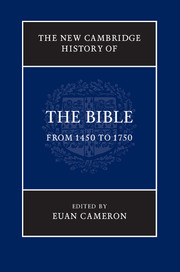Book contents
- Frontmatter
- Contents
- List of figures
- List of contributors
- Preface
- List of abbreviations
- Introduction
- PART I RETRIEVING AND EDITING THE TEXT IN EARLY MODERN EUROPE
- PART II PRODUCING AND DISSEMINATING THE BIBLE IN TRANSLATION
- PART III PROCESSING THE BIBLE: COMMENTARY, CATECHESIS, LITURGY
- 16 Authority
- 17 Theories of interpretation: The quadriga and its successors
- 18 The importance of the Bible for early Lutheran theology
- 19 The Bible in Reformed thought, 1520–1750
- 20 The Bible in Roman Catholic theology, 1450–1750
- 21 Orthodox biblical exegesis in the early modern world (1450–1750)
- 22 The Bible in the pulpit, 1500–1750
- 23 The Bible in catechesis, c. 1500– c. 1750
- 24 The Bible in liturgy and worship, c. 1500–1750
- PART IV THE BIBLE IN THE BROADER CULTURE
- PART V BEYOND EUROPE
- Afterword
- Select bibliography
- Select Bible bibliography
- Index
16 - Authority
from PART III - PROCESSING THE BIBLE: COMMENTARY, CATECHESIS, LITURGY
Published online by Cambridge University Press: 05 August 2016
- Frontmatter
- Contents
- List of figures
- List of contributors
- Preface
- List of abbreviations
- Introduction
- PART I RETRIEVING AND EDITING THE TEXT IN EARLY MODERN EUROPE
- PART II PRODUCING AND DISSEMINATING THE BIBLE IN TRANSLATION
- PART III PROCESSING THE BIBLE: COMMENTARY, CATECHESIS, LITURGY
- 16 Authority
- 17 Theories of interpretation: The quadriga and its successors
- 18 The importance of the Bible for early Lutheran theology
- 19 The Bible in Reformed thought, 1520–1750
- 20 The Bible in Roman Catholic theology, 1450–1750
- 21 Orthodox biblical exegesis in the early modern world (1450–1750)
- 22 The Bible in the pulpit, 1500–1750
- 23 The Bible in catechesis, c. 1500– c. 1750
- 24 The Bible in liturgy and worship, c. 1500–1750
- PART IV THE BIBLE IN THE BROADER CULTURE
- PART V BEYOND EUROPE
- Afterword
- Select bibliography
- Select Bible bibliography
- Index
Summary
‘Author’ and ‘authority’ share the same Latin root. To the educated medieval mind of the West, auctor and auctoritas were inseparable when it came to reliance on a text. The degree of ‘authority’ the text carried depended on the respect in which the ‘author’ was held. By the end of the Middle Ages to say that God was the ‘author’ of the Bible was automatically to claim a supreme ‘authority’ for the text. But it was increasingly realised that this was by no means a straightforward claim.
First, what authority determines which texts are ‘Scripture’ and make up the Bible? Can the Bible testify to its own authoritativeness, or is that the church's job? This became an extremely contentious issue in itself from the fifteenth century. The formation of the ‘canon’ was a slow process. Jerome was still debating the matter in the late fourth century, and a few loose ends remained a thousand years later. The books of the Bible are listed by the Council of Florence (1438–45), and again by the Council of Trent (1545–63). This became an important issue once more in the sixteenth century; for although Protestants did not dispute the divine authorship of the Old Testament they did continue to resist the inclusion of a number of books they regarded as apocryphal, but which the church had declared to be authoritative as parts of the Bible.
A more radical question which had exercised the early church had reappeared in the medieval controversies involving dualists such as the Albigensians. Some of these latter-day ‘Gnostics’ or ‘Manichees’ claimed that the Old Testament was not the work of God but of a second Power, responsible for the creation of matter and the entry of evil into the world. This possibility was still a sufficiently live issue for the Council of Florence and the Council of Trent to pronounce upon this too, both declaring the Old Testament to be of divine authorship just like the New. The Council of Florence asserts that ‘one and the same God is the author of the Old and the New Testament’, expressly anathematising the view of the Manichees that one Principle is the author of the Old Testament and the other of the New.
- Type
- Chapter
- Information
- The New Cambridge History of the Bible , pp. 387 - 417Publisher: Cambridge University PressPrint publication year: 2016



